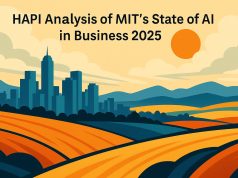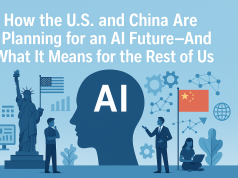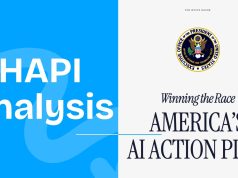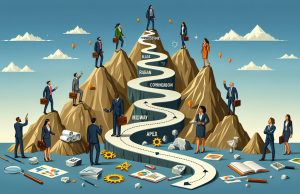The first 100 days of a leadership role offer rare, concentrated insights into how a leader adapts to complexity, pressure, and opportunity. Through the Human Adaptability and Potential Index (HAPI) lens, we can objectively assess President Trump’s second-term start — not politically, but as a study in human adaptability.
Below, each HAPI dimension is scored (out of 10), evaluated deeply, and connected to lessons anyone can use to enhance their own career and leadership journey.
🧠 1. Cognitive Adaptability
Score: 6/10
Definition:
The ability to adjust thinking strategies, learn new concepts quickly, and reframe problems under uncertainty.
What Happened:
Trump signed a record-breaking 142 executive orders, many of which reversed previous Biden administration policies. His actions were swift and decisive but heavily rooted in restoring past strategies rather than innovating new future-proof models. Initiatives lacked the cognitive diversification that might have anticipated and buffered upcoming legal, diplomatic, and economic reactions.
HAPI Insight:
High-speed execution ≠ High adaptability. Cognitive adaptability thrives not just on decisiveness, but on flexibility of thought — the willingness to question assumptions and invent new paths when existing models falter. Restoration of old policies alone showed strategic decisiveness, but limited adaptability to new realities.
Lesson for Personal Growth:
Ask yourself regularly:
- Am I solving today’s problems using yesterday’s methods?
- Am I challenging my own assumptions enough to discover better strategies?
💓 2. Emotional Adaptability
Score: 5/10
Definition:
The ability to regulate emotions under stress, respond empathetically, and adapt one’s emotional expression to the needs of different situations.
What Happened:
Throughout heavy lawsuits (200+ legal challenges), intense media scrutiny, and polarized public sentiment, Trump maintained a consistent tone of strength and confrontation. However, emotional responsiveness to broad societal anxiety — especially about inflation, economic uncertainty, and global instability — was notably absent. His messaging catered mostly to his core base, not to broader national emotional states.
HAPI Insight:
Durability is not emotional adaptability. True emotional adaptability balances resilience (self-stability) and resonance (sensing and addressing the collective emotional environment). Leadership is not just about enduring storms, but also about helping others weather them emotionally.
Lesson for Personal Growth:
Reflect daily:
- Am I just enduring challenges, or am I helping others feel secure through them?
- How often do I adjust my communication based on the emotional needs of my team, clients, or stakeholders?
🔁 3. Behavioral Adaptability
Score: 7/10
Definition:
The willingness and skill to alter routines, habits, and operational behaviors in response to new feedback or shifting contexts.
What Happened:
Trump’s team aggressively pursued systemic change — restructuring federal agencies, eliminating tens of thousands of jobs, and attempting to deregulate at unprecedented speed. These actions reflected bold behavioral shifts. However, the haphazard implementation (including reversed layoffs, lawsuits, and disrupted services) showed weak adaptive recalibration — a tendency to persist even when early warning signs suggested necessary adjustments.
HAPI Insight:
Bold change without iterative learning risks collapse. True behavioral adaptability involves piloting, listening, and scaling what works — not sweeping reforms executed without flexibility for mid-course corrections.
Lesson for Personal Growth:
Ask during every major initiative:
- Am I testing small and learning fast?
- Am I willing to adjust my behaviors based on early evidence, or am I charging ahead regardless?
🤝 4. Social Adaptability
Score: 4/10
Definition:
The ability to collaborate across differences, receive and integrate feedback, and build functional relationships across varied groups.
What Happened:
While Trump’s administration efficiently mobilized internal allies (e.g., Elon Musk’s DOGE leadership), external relationship-building — both domestically and internationally — suffered. Approval gaps widened, bipartisan cooperation shrank, and diplomatic tensions with allies and rivals alike escalated. This limited coalition-building reduced Trump’s margin for long-term resilience.
HAPI Insight:
Internal loyalty is not enough — sustainable leadership requires cross-stakeholder adaptability. Social adaptability is about understanding different “languages” — cultural, political, emotional — and adjusting strategies accordingly.
Lesson for Personal Growth:
Reflect weekly:
- Am I effective at building bridges with those who don’t automatically agree with me?
- Do I know how to adjust my approach to different cultures, personalities, and power dynamics?
📈 5. Growth Potential
Score: 6/10
Definition:
The ability to develop skills, systems, and initiatives that are scalable, sustainable, and able to evolve over time.
What Happened:
Trump’s second-term initiatives — including radical restructuring and trade war escalation — reflected a desire for long-term structural change. However, volatile market reactions, unstable legal standing, and mounting global tensions suggested weak infrastructure for enduring success. Immediate disruptions risked undermining future stability rather than seeding adaptable growth.
HAPI Insight:
Big visions fail without scalable, resilient scaffolding. Long-term impact is not about loud beginnings; it’s about building self-correcting systems that can weather evolving conditions.
Lesson for Personal Growth:
Every quarter, evaluate:
- Am I laying foundations that can scale sustainably?
- Have I built in systems that allow my growth strategy to evolve without starting over from scratch?
🌱 What This Teaches Us: Your Own “First 100 Days” Matter Too
While the stakes might differ between a presidency and a career pivot, the rules of human adaptability stay the same. You — as a professional, entrepreneur, creator, or leader — can design your next 100 days with HAPI principles at heart:
- Cognitive Adaptability: Read widely. Embrace ambiguity. Challenge assumptions.
- Emotional Adaptability: Build your resilience toolkit. Practice emotional resonance.
- Behavioral Adaptability: Test small. Learn fast. Pivot smarter.
- Social Adaptability: Connect across divides. Adapt your language and approach to new audiences.
- Growth Potential: Invest in scalable habits. Future-proof your career with continuous learning.
Because in the end, adaptability isn’t just about surviving the future. It’s about leading it.
🌟 Your 100-Day Breakthrough: How to Build a HAPI-Optimized Career Journey
If the first 100 days of a presidency can reveal a leader’s adaptability, your next 100 days can reveal — and redefine — your own potential.
Building a high-adaptability career isn’t about frantic action. It’s about intentional evolution across the five pillars of the Human Adaptability and Potential Index (HAPI). Whether you’re stepping into a new role, launching a business, or simply upgrading your current path, here’s how to engineer a personal breakthrough.
🧠 1. Cognitive Adaptability: Rewire Your Thinking
“The mind that adapts, wins.”
Why It Matters:
In a world where industries, technologies, and social expectations shift rapidly, your ability to think differently — to spot patterns, unlearn outdated models, and invent new approaches — becomes your ultimate career edge.
Action Steps for the Next 100 Days:
- Consume Widely: Spend 15 minutes daily reading outside your field (science if you work in finance; art if you work in tech). Cross-pollination breeds innovation.
- Challenge Assumptions: Start a “Belief Audit” — once a week, question one major assumption you hold about work, leadership, or success.
- Embrace Mental Prototyping: Before solving a problem, brainstorm three radically different approaches — even if they seem impractical at first.
Reflective Question:
“Am I flexible enough to thrive when my current knowledge becomes obsolete?”
💓 2. Emotional Adaptability: Build Your Resilience Reservoir
“Control yourself, or be controlled by circumstances.”
Why It Matters:
Career breakthroughs aren’t linear. Setbacks, rejections, and ambiguity are inevitable. What sets high performers apart is emotional self-regulation — the ability to stay calm, connected, and purposeful even under fire.
Action Steps for the Next 100 Days:
- Develop a Recovery Ritual: Create a 10-minute “reset” routine (breathwork, gratitude journaling, a quick walk) you can deploy after emotional shocks.
- Practice Emotional Flexing: When receiving criticism, respond with one question (“What would you do differently?”) instead of defensiveness.
- Build Empathic Muscles: In meetings or conversations, summarize others’ feelings before presenting your opinion.
Reflective Question:
“Am I creating emotional space for better decisions and stronger relationships?”
🔁 3. Behavioral Adaptability: Move Smarter, Not Just Faster
“Small, strategic pivots lead to massive breakthroughs.”
Why It Matters:
Your success isn’t determined by how much you work, but how often you adjust. Behavioral adaptability means noticing when habits, systems, or goals need tweaking — and acting decisively.
Action Steps for the Next 100 Days:
- Micro-Experiment Weekly: Launch one small experiment each week (e.g., a new communication method, productivity hack, or leadership style). Track results neutrally.
- Create Feedback Loops: Ask trusted peers or mentors to give you one behavioral improvement suggestion every two weeks.
- Build Iterative Mindsets: Celebrate “version 1.0” — prioritize rapid prototypes over perfect planning.
Reflective Question:
“Am I iterating based on evidence or repeating based on habit?”
🤝 4. Social Adaptability: Master the Art of Relationship Engineering
“Your network isn’t just who you know — it’s how you adapt to them.”
Why It Matters:
Collaboration, influence, mentorship, and client trust all hinge on social flexibility. People change. Organizations evolve. Careers soar when you can connect across differences, navigate conflict gracefully, and expand your relational versatility.
Action Steps for the Next 100 Days:
- Engage Outside Your Bubble: Every month, meet (virtually or physically) someone working in a different industry, culture, or demographic.
- Customize Your Communication: Practice mirroring — adjusting your communication style (formal, casual, structured, free-flow) based on who you’re speaking with.
- Bridge Conflicts Thoughtfully: When disagreement arises, start with the sentence: “Help me understand your view better.”
Reflective Question:
“Am I adaptable enough to build trust across boundaries?”
📈 5. Growth Potential: Invest in Your Future Self
“Play the infinite game — grow for a lifetime, not a season.”
Why It Matters:
Immediate wins are seductive, but real career mastery is measured by how much potential you build for tomorrow. Growth isn’t an event — it’s an evolving system of skills, habits, networks, and adaptability.
Action Steps for the Next 100 Days:
- Commit to a Keystone Skill: Identify one future-critical skill (e.g., AI fluency, storytelling, negotiation) and build a structured learning plan around it.
- Plant Long-Term Seeds: Spend 10% of your working time on projects that may not pay off for 12–24 months — future-proofing your value.
- Build Legacy Systems: Think beyond tasks; design systems (knowledge bases, personal brands, communities) that compound your impact.
Reflective Question:
“Am I building a self-evolving system that grows beyond my current role?”
🚀 Closing Perspective: Adaptability Is the New Ambition
Your next 100 days are not about doing more — they are about becoming more. By consciously enhancing your cognitive, emotional, behavioral, social, and growth-oriented adaptability, you won’t just survive career turbulence — You’ll lead it. You’ll shape it. You’ll own it.
Because in the age of acceleration, the most powerful strategy is not dominance or defense — it’s dynamic evolution.
And it starts with how you move today.




























